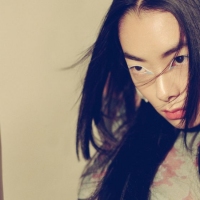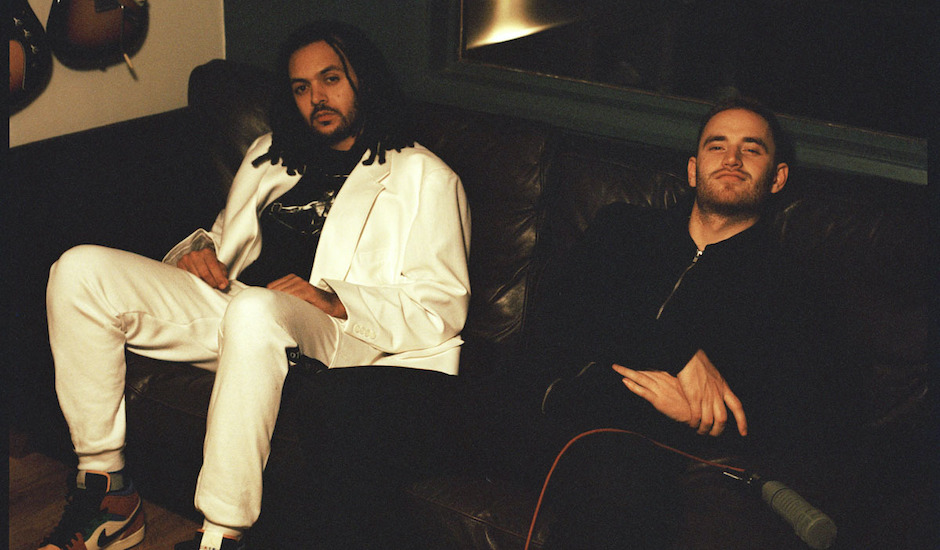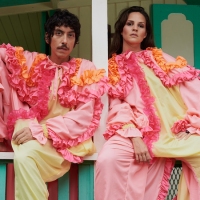 The drag and drama of pop's adventurous star, Rina SawayamaRina Sawayama’s combination of 00s-Britney-meets-Evanescence is enough to give you whiplash. That’s exactly what she’s after.
The drag and drama of pop's adventurous star, Rina SawayamaRina Sawayama’s combination of 00s-Britney-meets-Evanescence is enough to give you whiplash. That’s exactly what she’s after.

Tom Misch, on building a world with Yussef Dayes: "We never intended to make an album."
On their new collaborative album, Tom Misch and Yussef Dayes prove a potent mix, pushing each other in intriguing directions.
Header image by Adama Jalloh.
“You know, it was never a dream of mine to be a musician.”
If Tom Misch isn’t living his dream, then he’s landed the starring role in somebody else’s wildest fantasies. It’s not often you hear an artist put their career down to ‘accidents happen,’ but some twists of fate are far more fortuitous than others. “I knew I loved making music, but I hadn't worked out what I was gonna do yet. I was going through the education system seeing what was going to happen, and then music just took off on Soundcloud.”
Tom was six months into a jazz guitar course at Trinity Laban when that side-hustle truly came to the fore, his studious intentions as telling as his decision to go his own way. “I enjoyed it, but I just wanted to focus more on just making…,” he recalls, his thoughtful pause making for poetic truth. “I was kind of already doing what I wanted to be doing.”
If Laban aimed to impart jazz by way of lessons and lectures, Tom’s familiarity with the form was more natural, the result of noodling about on an electric guitar for years and years. It’s a presence in his work much like it was a presence in the work of his influences, mid-’90s hip hop bards such as De La Soul, Busta Rhymes, Erykah Badu and – above all – J Dilla. “Dilla is, for me, the forefront of that,” he says of his hip-hop passions, and there’s no doubt about it: the man’s named songs for Dilla, dropped songs for Dilla, taken passes at famous Dilla samples, and named his dog Dilla. Even the puppy’s taken to crate diggin’. It’s more than just a string of dedications, though – it’s manifest in the stilted drum programming, aqueous synth lines and reserved guitar licks he lays, all key tenets of 2014’s Beat Tape 1.
Beat Tape 2 followed in 2015, a slighter-yet-longer project that saw the beatsmith pushing his talents further into the songwriting sphere, collaborating with artists such as Carmody, Loyle Carner, Jordan Rakei and Zak Abel. It falls as a perfect intermediary between his beat tape arrival and his debut album, Geography, which saw the renewed singer-songwriter burst onto the scene. It’s a striking maturation, with Misch using his ever-escalating skillset to incorporate funk, jazz, soul, disco, hip-hop and singer-songwriter sensibilities.
Geography opens with a cinematic musing on art, one soon superseded by a wordless guitar jam awash with inflection and character. The technical standard here never falters, only subsiding in service of the songs – Lost In Paris relents to craft a GoldLink-supported slice of soul, South of the River finds drive in his decidedly disco licks, and It Runs Through Me sounds like John Mayer woke up in 2004 with a hankering for R&B instead of the blues. Misch self-released the record, throwing a release party at that start of April. It was there that he met Yussef Dayes.
That’s not entirely honest: the pair had one encounter years earlier, when an eight-or-nine-year-old Misch saw a yet-impressive Dayes play drums at a school talent show. The South East London students continued on their paths, and as Dayes blazed a trail into the city’s vibrant jazz scene, Misch fell into his own creative passions. Misch became a fan of Dayes’ propulsive, experimental work on Yussef Kamaal’s Black Focus, and Dayes a fan of Misch’s smooth, guitar-driven beats. They met as peers, but also as strikingly distinct voices, with Misch’s well-heeled convention far removed from Dayes’ experimental tendencies. “We were just fans of each other, and we thought ‘let's just make some music,’” remembers Misch, “and there was just something really special from the get go.”
“We never intended to make an album, that's the thing: we got in the studio with no expectations,” he recalls. “It just turned into an album, we intended to just make a few tracks and we just kept going.” That incidental rapport was the very thing that prompted their unlikely record, a creative partnership that proved more successful than most. Tom puts it simply: “it felt organic.” It’s strange that the pair would creatively catalyse each other, with their seemingly incongruent visions a focal point since their arrival: The FADER posed that there was “no obvious path for the pair to pursue,” and Consequence of Sound noted their “very different sonic backgrounds.”
Those different elements made for a tight solution, one that blends in a way that couldn’t be wholly attributed to either artist. “I think I was able to put Yussef in a context where he's playing in songs, as opposed to kind of instrumental jams,” says Misch, the more mainstream mediator. “I was able to kind of produce tracks and showcase Yussef without it just being all about the drums.” That’s not to dismiss the power of a mean break – anybody who names their dog Dilla is bound to have a love of percussion. “It was very exciting… Yussef is probably the person I most want to work with in the world when it comes to drums, so when we got in the studio I was very excited.”

Image by Joshua Osborne.
Yussef’s co-starring role – a rarity for a drummer, particularly outside of the stricter jazz scene – saw him at the creative heart of the record, quietly defining the sound with beat and rhythm alone. “You just click record and he comes out with some amazing stuff, and it just sparked so many ideas… I think that's why the record came so organically and easily, because we were both full of ideas, and if he could play something that excites me, then that sets me off.” It’s in the first single, What Kinda Music, which sees Yussef’s signature kit bringing a propulsive drive to Misch’s melodies, pushing his lyrics into darker, more abstract territories.
A heaving synth line embellishes Dayes’ otherworldly cadence, Misch’s alienated lyrics mired in a lingering echo. It’s a brooding palette brought to life in Douglas Bernardt’s music video, a paranoid flight through the labyrinthine train carriages and fantastic forests of Kiev: the gloomy, fatalistic lyrics find a form in both the ever-encroaching environment and the faces of commuting strangers, framed with the same jarring, panicked gaze. Misch and Dayes cameo as characters in a world of their building; bystanders bearing witness to a silent breakdown. What Kinda Music finds not only a sweet synthesis, but a wholly new set of skills, ones cultivated individually as much as communally. “I just start going in one direction,” said Misch of their process. “It kind of allowed me to focus on other things, because Yussef was in charge of the rhythm… I could focus on other stuff. It's a different process.”
It’s a powerful, confident single, but the answer to that titular question isn’t quite as clear cut. “You can't really put a tag on it,” he says of their jazz-aligned blend. “Me and Yussef have different influences but there's also some common ground, so when collaborating, it was quite exciting because we'd find music that we love together that we both love. You know, we both love Radiohead, and we both love Madlib... but there's stuff that Yussef's into that I'm not, and then I'd get pulled that way, and likewise with him, he tried stuff that he hadn't before.”
What Kinda Music leads into Festival, a mournful slow-burner that builds to a delicate drum-laden falsetto, whilst shades of Indiana appear on Nightrider, courtesy of Gary’s own Freddie Gibbs, the sole emcee on the record. “Yussef recommended we should get Freddy on,” explains Tom, who leads the feature with two easygoing verses. “I've been a big fan of him and I think we just wanted to get something new, something fresh and something unexpected, and he felt like the right guy.”
Tidal Wave rises like the tide, ebbing from the quiet verse to the bombastic chorus, and The Real taps into Misch’s tape days, pairing a vocal loop with Daye’s organic drums. “In my bedroom, I can do the beat tapes, I could record my vocals, but I could never record live drums,” reminisced Misch, explaining the importance of the Greenwich studio the pair called home. Kyiv, named for the city in which the duo cut three of their music videos, is the album’s only live jam, a three-man piece featuring bassist Rocco Palladino – yes, the very same. His bass anchors a showcase of Yussef and Tom’s ever-tightening relationship, the wah-wah tones of Misch’s guitar interplaying with Dayes’ crisp kit on the fly. There’s a lot of scope on What Kinda Music, which is to say, it’s not the kind of record you’d normally expect to hear from Blue Note Records.
“Yussef and I are big fans of Blue Note, and when we heard there was a possibility of releasing a record on Blue Note, we kind of just jumped at that idea,” Misch remembers, rapt about releasing their forward-thinking fusion through one of jazz’s most storied labels. “It just kind of became a reality. They were interested, I remember speaking to the head of Blue Note on FaceTime, and it was just really quite a special moment.” The moment resonates not only with Misch and Dayes, but with many of their London contemporaries, courting acclaim with novel, non-traditional takes on jazz music. “The record isn't strictly jazz, but it draws from jazz, and it's quite nice to have something like that on Blue Note, because most of their stuff is more down the jazz lane.”

Image by Bardha Krasniqi.
If the good news is that the record was finished months ago, the bad news is the circumstances in which it arrives. The pandemic is something Misch has been particularly vocal about, hailing health workers for their courage and staging ‘Quarantine Sessions’ for fans, offering instrumental jams to cuts from Nirvana, Solange, Thundercat and – in one inspired mashup – both Luther Vandross and Mac Miller. “I guess the idea of Quarantine Sessions is content that can take people's mind off things, and kind of calm down people,” he says, the ad-free videos doubling as a call for donations to UK charity Warchild. “The idea is it's just guitar so there are no vocals, you know, it's kind of a break from the news and stuff, it's kind of more relaxing.”
It’s not hard to believe there’s something relaxing in it for him, too: it’s far from ideal, but still, there are worse places to be stuck for a veteran of the home studio. “People are realizing how important art is at a time like this, when they're just so bored at home,” offers Misch, challenging those more stringent definitions of ‘essential.’ “Music and films and stuff like that, they’re really important right now.” There’s a real power in finding silver linings amongst the storm, and for stir-crazy fans, Yussef and Tom’s timing is but another happy accident.
What Kinda Music is an accident in many ways: Misch never planned to be a musician, and Dayes never planned to lay a record alongside the singer-songwriter. Blue Note, too, were a surprise, as was the way that their two distinct styles fused into a compelling, accessible blend of innovative instrumentation and renewed character. Kyiv was precipitated by a leftover reel of film, and the desire to collaborate led to an unlikely friendship between the pair’s parents – “they now see each other more than we do,” quipped Dayes. The duo are in good company: Penicillin was an accident, as were beer, Velcro, Viagra, and The Rolling Stones. I’m not saying it’ll function as antibiotics, but What Kinda Music is one of the year’s most intricate and immersive efforts, and in a time such as this, that might just heal something.
Missing this one would be more than an accident – it’d be a mistake.
What Kinda Music, the new album from Tom Misch and Yussef Dayes, is out now via Blue Note Records / Caroline Australia.
Follow Tom Misch: FACEBOOK
Follow Yussef Days: FACEBOOK
 The drag and drama of pop's adventurous star, Rina SawayamaRina Sawayama’s combination of 00s-Britney-meets-Evanescence is enough to give you whiplash. That’s exactly what she’s after.
The drag and drama of pop's adventurous star, Rina SawayamaRina Sawayama’s combination of 00s-Britney-meets-Evanescence is enough to give you whiplash. That’s exactly what she’s after.
 Returning to Puerto Rico with Buscabulla: “This is our journey.”Years since leaving their home in search of fame, Buscabulla didn’t feel like themselves - and that needed to change.
Returning to Puerto Rico with Buscabulla: “This is our journey.”Years since leaving their home in search of fame, Buscabulla didn’t feel like themselves - and that needed to change.